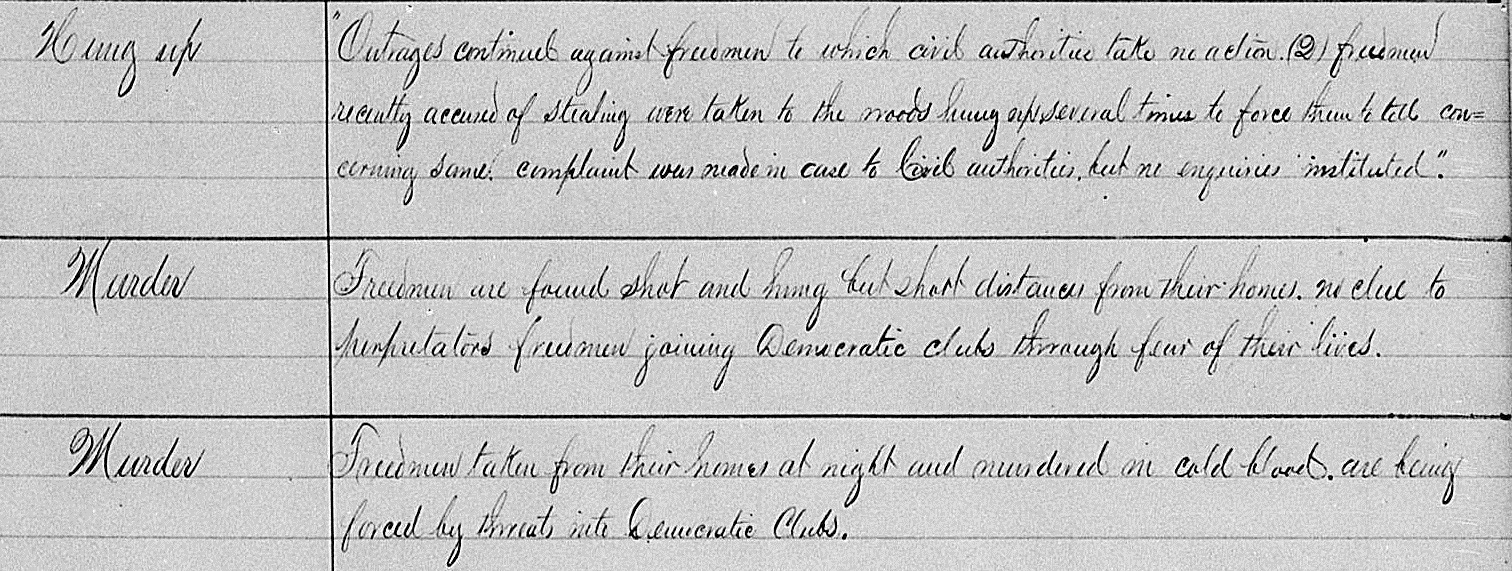Outrages and Murders, Louisiana, 1868

Freedom for the slaves was short-lived. Hundreds of whites in Louisiana would see to that. Just as assertively, former slaves continued to fight for justice and secure their hard-won rights, often losing their lives in the struggle. Racial violence was so omnipresent in 1868, just three years after the end of the Civil War, that the Freedman’s Bureau assistant commissioner for the state of Louisiana filled an entire ledger book in a mere six months.
A few examples from a single page, representing just three parishes, hints at the conditions:
 In Madison Parish, where Milliken’s Bend was located, freedmen fled from neighboring parishes, running for their lives. Whites were angry that blacks had the vote at all – and if blacks voted for Radical Republicans, the party who had supported freedom, they put their lives at risk. Even the white Freedmen’s Bureau agent was being threatened.
In Madison Parish, where Milliken’s Bend was located, freedmen fled from neighboring parishes, running for their lives. Whites were angry that blacks had the vote at all – and if blacks voted for Radical Republicans, the party who had supported freedom, they put their lives at risk. Even the white Freedmen’s Bureau agent was being threatened.
Off to the west, in the vicinity of Shreveport, conditions were even worse. So much violence took place there during Reconstruction it became known as “Bloody Caddo.”
 Likewise, much of the violence appeared to revolve around politics. White violence was forcing freedmen to vote for Democrats (the party of unreconstructed Southern whites), and murders were commonplace. The local law officials ignored the deaths and violence. They, too, were part of the white power structure, and were likely in sympathy with those who did the killings.
Likewise, much of the violence appeared to revolve around politics. White violence was forcing freedmen to vote for Democrats (the party of unreconstructed Southern whites), and murders were commonplace. The local law officials ignored the deaths and violence. They, too, were part of the white power structure, and were likely in sympathy with those who did the killings.
Reconstruction is a time period often forgotten today. Both blacks and whites prefer to remember other times. But this country can never reckon with race until we reckon with what happened – and what was promised but didn’t happen – during the turmoil of Reconstruction. And although the Civil War gets all of the attention, what we fail to realize is that the war did not end. Not in the South. It continued for a decade more, and many men continued to lose their lives over the very issues for which they had fought, wheather wearing the blue or the gray.
Sources:
Register of Murders and Outrages, May-Dec. 1868; Records Relating to Murders and Outrages; Records of the Assistant Commissioner for the State of Louisiana, Bureau of Refugees, Freedmen, and Abandoned Lands, 1865-1869; NARA Microfilm M1027 Roll 34. Online at familysearch.org
Gilles Vandal, “Bloody Caddo: White Violence against Blacks in a Louisiana Parish, 1865-1876,” Journal of Social History 25, no. 2 (Winter 1991): 373-388. [online access requires Oxford Academic account $$]
John Andrew Prime, “Lynching’s Bloody Terror Toll Studied,” Shreveport Times, Feb. 15, 2015.

Comments
Outrages and Murders, Louisiana, 1868 — No Comments
HTML tags allowed in your comment: <a href="" title=""> <abbr title=""> <acronym title=""> <b> <blockquote cite=""> <cite> <code> <del datetime=""> <em> <i> <q cite=""> <s> <strike> <strong>